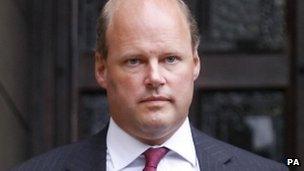RBS chief Stephen Hester's £963,000 bonus criticised
- Published
- comments

Stephen Hester's bonus is on top of his £1.2m basic salary
A £963,000 bonus in shares awarded to Royal Bank of Scotland boss Stephen Hester has been strongly criticised.
The Labour leader, Ed Miliband, said the payout represented a "disgraceful failure of leadership by the Prime Minister".
But the Chancellor, George Osborne, said the previous Labour government was responsible as it had forged the contract that included a bonus clause.
Lib Dem minister Jeremy Browne said Mr Hester should turn down the bonus.
RBS is 82%-owned by UK taxpayers and the body that oversees the government's stake said the bonus reflected Mr Hester's work "towards rebuilding RBS".
UK Financial Investments said the bonus, which is on top of Mr Hester's £1.2m salary, "reflects the significant contribution he has made towards rebuilding RBS in 2011".
A spokesman for Prime Minister David Cameron said he had not been involved in the decision.
The Conservative Mayor of London, Boris Johnson, said "the government should step in and sort it out" as RBS was "not a normal bank" and there "should be a concept of public service and duty to the wider British public".
Our business editor, Robert Peston, said the government paid the bonus as there was a real risk that Mr Hester and the rest of the board would leave their posts.
Dr Ruth Bender, from the Cranfield School of Management, insisted Mr Hester's bonus was reasonable.
"We need to pay him that bonus because we can't afford for him to leave and a million pounds isn't very much to pay to retain him in a very demanding job which everybody says he's doing very well," she said.
Job cuts
Following the announcement of Mr Hester's bonus, UKFI said: "As the largest shareholder in RBS, we have worked closely with the board to ensure that pay is aligned with the interests of shareholders and properly rewards long-term performance.
"Stephen Hester's pay reflects the significant contribution he has made towards rebuilding RBS in 2011."
For the past two years, part-nationalised RBS and Lloyds Banking Group have paid no cash bonuses of more than £2,000.
RBS has announced thousands of job cuts, although it recorded a £2bn profit in its most recent trading quarter, compared with a £1.6bn loss in the same period in 2010.
David Fleming, the Unite union national officer, said: "How can a Royal Bank of Scotland senior banker who is responsible for sacking over 21,000 workers be rewarded in this way?", while the TUC described it as "utterly unacceptable".
Foreign Office minister Mr Browne told the BBC's Question Time: "There's a question of honour. Even if there's a contractual opportunity for him to have a bonus it doesn't mean he has to accept it."
Mr Browne said Mr Hester was paid more in three days than a soldier serving in Afghanistan received in a year.
"He should reflect on that. He is effectively a public servant in a bank which is almost completely owned by us the taxpayers," he said.
"He needs to think like a public servant who has a duty to his country, not just his own wealth."
Asked if he should turn down the bonus, the minister said: "No-one's forcing him to take this money. He could struggle on with £1.2m."
George Osborne: "The arrangements for paying the bonus were determined by the contract he signed"
Following a speech on "moral" capitalism last week, David Cameron was asked whether he would act to stop the bosses of state-owned banks receiving £1m bonuses.
He replied: "The short answer is yes."
Last year, Mr Hester received a bonus of more than £2m and the prime minister said: "If there is a bonus [this year], it will be a lot less than it was last year."
Deputy Prime Minister Nick Clegg has said ministers are "constrained" by contractual arrangements agreed by the last government at the time of Mr Hester's appointment regarding his bonus.
Shareholder power
Matthew Sinclair, from campaign group the Taxpayers' Alliance, told the BBC the government should block any bonuses for Mr Hester until the taxpayers' investment in RBS is repaid.
"It's incredible that we're seeing a huge bonus which should be reflecting performance in the interest of shareholders and that's you and me," he said.
On Monday, Business Secretary Vince Cable announced a series of measures designed to rein in excessive executive pay.
They included more power for shareholders to veto salary and redundancy packages, and encouragement for firms to increase diversity on their boards.
Labour said the proposals did not go nearly far enough, and should have included steps like including ordinary employees on remuneration boards.
Dr Ruth Bender, Cranfield School of Management: Hester package "reasonable"
A Conservative Party spokesman said Labour had failed to do anything to curb multimillion-pound bonuses during their time in government.
"It would clearly have been unacceptable for Stephen Hester's bonus to have been the same as last year. So we are pleased it is less than half of that this year," he said.
But TUC leader Brendan Barber said the bonus was "a very bad decision", especially at a time of public sector pay restraint.
"To be told that a banker supposed to be working for the public service is to be made an exception with this huge increase, it's utterly unacceptable."
- Published26 January 2012
- Published26 January 2012
- Published23 January 2012